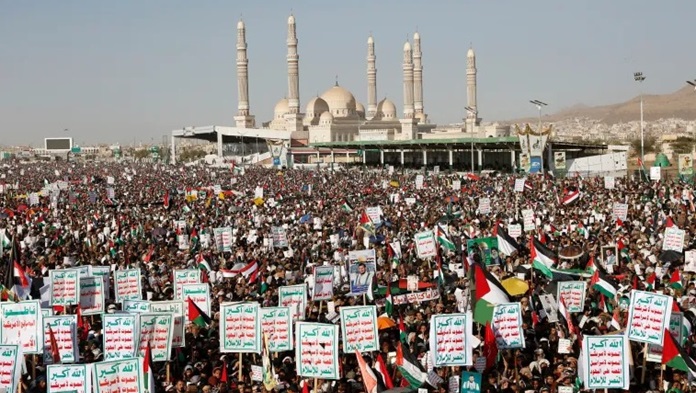The US and Britain have unleashed waves of attacks on Yemen, supported by Australian military personnel.
On 3 February, US missiles and planes hit at least 30 targets across at least 10 locations, following two attacks in January.
The bombings are a response to harassment by Houthi forces of shipping heading to Israel in the Bab al-Mandab Strait, the narrow waterway at the entrance to the Red Sea which leads to the Suez Canal.
“If Gaza does not receive the food and medicine it needs, all ships in the Red Sea bound for Israeli ports, regardless of their nationality, will become a target for our armed forces,” a Houthi spokesperson said.
Western powers have refused to lift a finger for the Palestinians suffering untold horrors in Gaza but have leapt into action to ensure their vessels can use the Suez Canal, through which passes about 15 per cent of world shipping traffic.
The Houthi movement—inspired by Shia Islam—controls the west of Yemen, including the capital Sanaa and the Red Sea coast. They have massive backing for their campaign in solidarity with Palestine, with huge numbers rallying in Sanaa.
While other Arab regimes have done no more than issue pious statements, the Houthis have acted—and it is unlikely that the Western military action will end their attacks.
The Washington Post quotes Ibrahim Jalal, an analyst with the Middle East Institute, who “described the Houthis as a nimble militant group hardened by years of guerrilla warfare in Yemen and weathering years of Saudi-led airstrikes.
“They have ‘little in the way of large-scale, permanent military sites’, he said, ‘and instead use mobile launchpads for rockets and drones in addition to networks of tunnels and caves that makes their targeting highly complicated’.”
Influence
Yemen has a long history of fighting British imperialism, forcing the British to withdraw in 1967. But the Houthi movement is the product of a later wave of struggle, sparked by the Arab revolutions of 2011.
The Houthis began to gain influence when supporters flooded on to the streets of Sanaa in August 2014, demanding the regime step down, that fuel subsidies cut the month before be reinstated and calling for a more representative government.
With Western backing, Saudi Arabia and the UAE waged a seven-year campaign to crush the movement. It led to 377,000 deaths and 4 million people displaced by the end of 2021, according to the United Nations.
In December last year, the World Bank ranked Yemen the 31st poorest country in the world—but that was using 2011 data. After years of war, the reality will be much worse.
Despite Saudi conventional military superiority, the Houthis fought them to a standstill and Riyadh is looking to turn a ceasefire into a permanent settlement. Meanwhile China recently brokered a resumption of diplomatic relations between Saudi Arabia and Iran.
As British Marxist Alex Callinicos writes, “The regional balance of power is shifting against Western imperialism. This is why the Saudis reacted to the US-British airstrikes by warning against ‘escalation’ and Oman said they went ‘against our advice’.”
The Houthi movement is often described by commentators as an Iranian proxy, but as an article in The Conversation put it, “There is limited evidence that Iran controls the Houthis’ strategy.
“The Houthis reportedly ignored Iranian advice not to take over Sanaa in 2014 and, while the Arab coalition [spent in 2019] between US$5-6 billion each month on the war, Iran’s spending on the Yemen war has been estimated at little more than several million dollars each year.
“There are also significant doctrinal differences between the Houthis’ Zaydi version of Shia Islam and that practised in Iran. Some Houthi activists are even on record stating that the Iranian system could not be implemented in Yemen because Sunni Muslims constitute a majority.”
Hypocrisy
The attacks on Yemen show that President Joe Biden’s calls for Israel to exercise “restraint” are hollow hypocrisy.
In recent weeks the US has also bombed Iraq and Syria. Israel routinely bombs Lebanon and has also attacked Syria and Iran.
This is the so-called rules-based order—where Western imperialism can act with brutal impunity while the Palestinians are told they cannot fight for their national liberation.
The risk is that attacks by the US or Israel may spark a wider conflagration, such as war with Hezbollah or Iran, with the massive suffering that will involve.
Meanwhile the Labor government backs US and Israeli aggression.
Our task in Australia is to build a solidarity movement powerful enough to force Labor to drop its support for war and genocide.
By David Glanz






